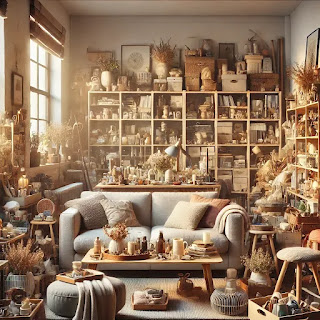Have you ever wondered why humans seem so inclined to fill empty spaces in their homes with things? Whether it’s trinkets, furniture, or decorations, the need to accumulate items can often feel overwhelming. But what drives this tendency? Is it a basic human need, or have we been conditioned to equate material possessions with happiness and security?
The Comfort of Clutter
One reason we fill our homes with stuff is for comfort. Objects often carry sentimental value, acting as tangible reminders of special memories or people. When we surround ourselves with these things, we feel connected to our past, which offers a sense of emotional security. In some cases, people buy items to express who they are, creating a sense of identity and personal space.
The Illusion of Control
In a world that often feels chaotic and unpredictable, owning things can provide a false sense of control. When you curate your environment, you may feel that you are in charge, even if it's simply organizing a bookshelf or rearranging furniture. This illusion of control can be comforting when life outside feels uncertain.
Consumer Culture and Its Influence
Our consumer-driven society plays a big role in why we constantly seek to own more. Advertisements convince us that happiness is just one purchase away. The idea that new items bring fulfillment is ingrained deeply in modern culture, leading many to feel incomplete without the latest gadget, trend, or decoration.
Filling Emotional Voids
For some, buying things becomes a way to fill emotional voids. A stressful day might lead to retail therapy, where purchasing items serves as a temporary mood booster. However, this habit can lead to clutter and even more stress as our homes become filled with unnecessary things. Over time, this cycle can make people feel trapped in a materialistic mindset.
Minimalism: The Antidote?
In contrast, many have started embracing minimalism as a lifestyle choice. The idea is simple—owning fewer things leads to less stress and a clearer mind. Minimalism advocates for intentionality in our purchases and encourages us to evaluate the emotional value of objects in our lives.
Mindful Spaces, Mindful Lives
By consciously deciding what we bring into our homes, we can create spaces that reflect who we are without being overwhelmed by clutter. Taking a mindful approach can shift our focus away from material possessions toward more meaningful experiences and relationships.



No comments:
Post a Comment